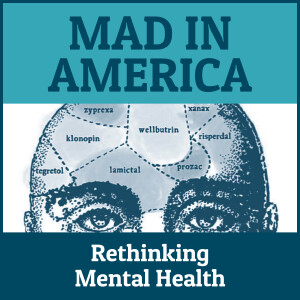
Mad in America: Rethinking Mental Health
Health & Fitness:Mental Health
This week on MIA Radio, we chat with Paula J. Caplan. Paula is a clinical and research psychologist, author of books and plays, playwright, actor, director, and activist. She was born and raised in Springfield, Missouri, attended Greenwood Laboratory School, received her A.B. with honors from Radcliffe College of Harvard University, and received her M.A. and Ph.D. in psychology from Duke University.
Currently, she is an Associate at the Du Bois Institute, Hutchins Center for African and African American Research, Harvard University. She has been a Fellow at the Women and Public Policy Program of the Kennedy School of Government at Harvard; a Lecturer in Harvard's Program on Women, Gender, and Sexuality in the Psychology Department. She is former Full Professor of Applied Psychology and Head of the Centre for Women's Studies in Education at the Ontario Institute for Studies in Education, and former Lecturer in Women's Studies and Assistant Professor of Psychiatry at the University of Toronto.
Paula is also a passionate and steadfast advocate for service members, veterans and their families. She has written: When Johnny and Jane Come Marching Home: How All of Us Can Help Veterans and has founded the Listen to a Veteran! Project.
In this interview, we discuss Paula’s work to support service members, veterans and their families, and the role psychiatric drugs have played in harming these communities.
We discuss: Paula’s experiences that drove her towards working in mental health and advocating for veterans, which came from her father’s service in World War II. This included combat in the Battle of the Bulge. After hearing her father’s story that had been recorded as part of a history project, she learned her father had been a forward observer, and as result learned he had been on the front lines of the war. This led to her realizing that most American’s don’t understand military service and the only way of doing this, is through hearing veterans’ stories. Prior to the invasion of Iraq, she became concerned about the care of service members of veterans and veterans upon their return from war, and more concerned of the “psychiatrization”, diagnosing and prescribing psychiatric drugs to veterans. To get started in her efforts, she began by listening to a veteran share his experiences with her. The veteran talked for three hours, and Paula just listened. The next day, he called her and thanked her for listening, as he got a good night sleep for the first time in years. This led to her starting Listen to a Veteran, which was originally called “When Johnny and Jane Come Marching Home”. As part of this initiative, a veteran of any era can meet with another person who has volunteered to listen to the veteran share any stories or experiences they’re interested in sharing. Paula has faced barriers in getting this program expanded to the VA or throughout the “mainstream” mental health community because the system has been created to function based upon current “evidenced-based” best practices. How Paula is positive that we are currently causing harm to veterans and that alternative approaches need to immediately be implemented throughout the Department of Defense and Department of Veterans Affairs. How “therapy” needs to be dropped from the terms “art therapy”, “music therapy” and the like, so we can stop pathologizing individual experiences, and instead support people in doing things that improve their overall well-being. Any veterans who want to be a listener as part of Paula’s Listen to a Veteran initiative, or would like to have someone listen to them, they can go to listentoaveterans.org.More Episodes
We Should Listen to Our Emotional Pain: An interview with Paul Andrews
 2024-10-23
2024-10-23
Why Does a Parent Medicate a Child? An Interview with My Mother
 2024-10-09
2024-10-09
From Freud to Fanon: How Daniel Gaztambide is Redefining Psychoanalytic Practice
 2024-10-02
2024-10-02
The Path from Trauma to The Power of Nature: An Interview with Banning Lyon
 2024-09-04
2024-09-04
Multiplicity and Mad Studies: An Interview with Jazmine Russell
 2024-08-28
2024-08-28
The Maudsley Deprescribing Guidelines- An Interview with David Taylor and Mark Horowitz
 2024-08-21
2024-08-21
Our Medical System Protects Wrongdoers and Punishes Whistleblowers: An Interview with Carl Elliott
 2024-08-07
2024-08-07
Beyond Paternalism or Abandonment in Mental Health Care: An Interview with Neil Gong
 2024-07-17
2024-07-17
The Connection Cure: An Interview with Julia Hotz
 2024-07-10
2024-07-10
Conveying Hope, Empowering Teens: An Interview With Jessica Schleider
 2024-06-26
2024-06-26
Madness, Utopia and Revolt: An Interview With Sasha Warren
 2024-06-19
2024-06-19
Demedicalizing Depression: An Interview with Milutin Kostić
 2024-05-22
2024-05-22
Leaving Biological Psychiatry Behind - An Interview With Rodrigo Nardi
 2024-05-15
2024-05-15
Context and Care vs Isolate and Control - An Interview with Arthur Kleinman
 2024-04-24
2024-04-24
Undisclosed Financial Conflicts of Interest in the DSM-5: An interview with Lisa Cosgrove and Brian Piper
 2024-03-20
2024-03-20
Deprescribing Psychiatric Drugs to Reduce Harms and Empower Patients - Swapnil Gupta
 2024-03-06
2024-03-06
Is Madness an Evolved Signal? – Justin Garson on Strategy Versus Dysfunction
 2024-02-28
2024-02-28
'It Was a Joint Effort'- Deborah Kasdan on Bringing Her Late Sister's Story to Life
 2024-02-21
2024-02-21
What if Much of What you Thought you Knew About Mental Health was up for Debate?
 2024-01-25
2024-01-25
The Psychological Humanities Manifesto: An Interview with Mark Freeman
 2024-01-17
2024-01-17
Create your
podcast in
minutes
- Full-featured podcast site
- Unlimited storage and bandwidth
- Comprehensive podcast stats
- Distribute to Apple Podcasts, Spotify, and more
- Make money with your podcast
It is Free
You may also like

Mental Health Insights


MQ Open Mind


Speaking of Suicide


Depression Talks Podcast


Young Blood - Men’s Mental Health


- Privacy Policy
- Cookie Policy
- Terms of Use
- Consent Preferences
- Copyright © 2015-2024 Podbean.com


 iOS
iOS Android
Android